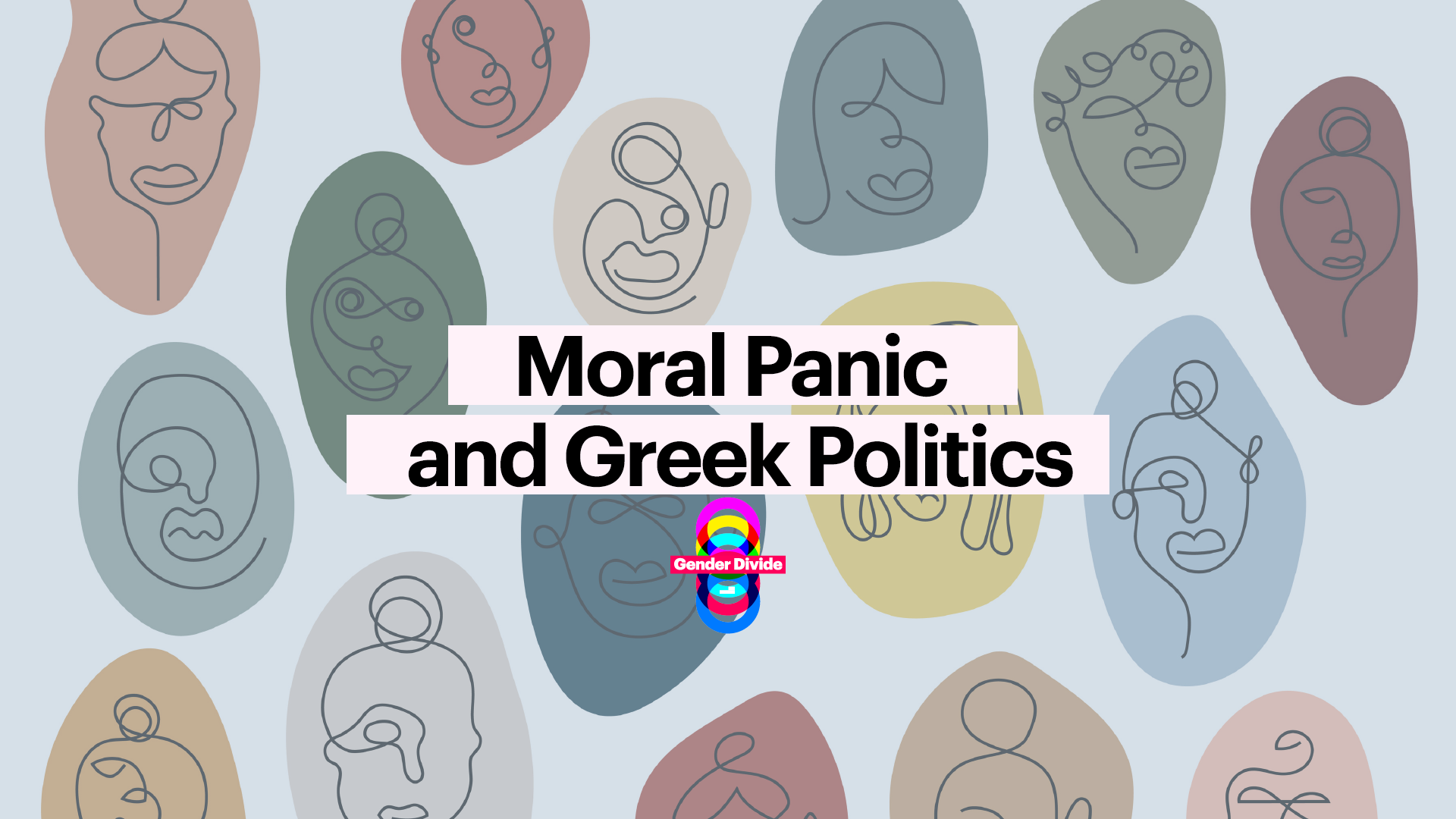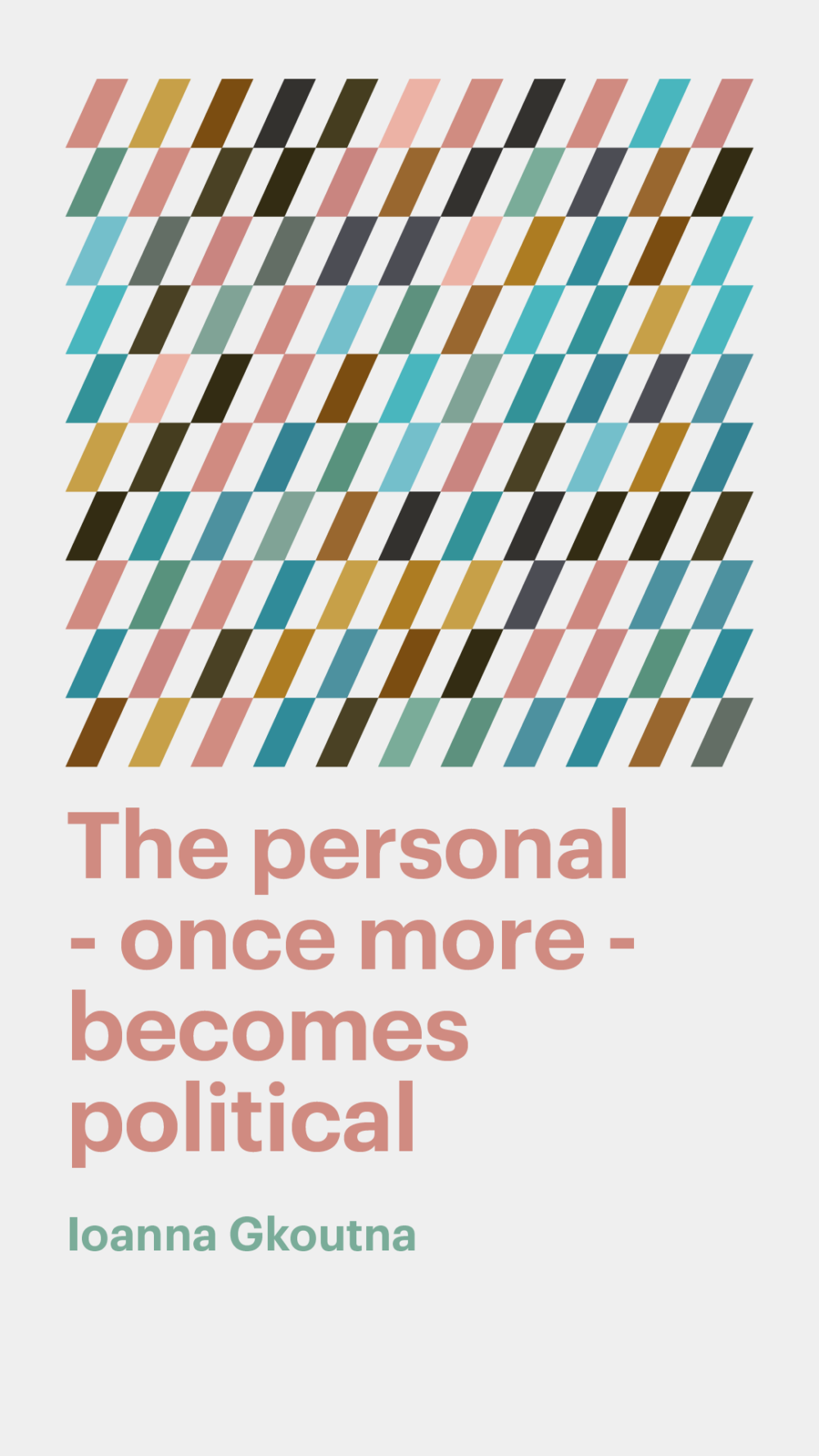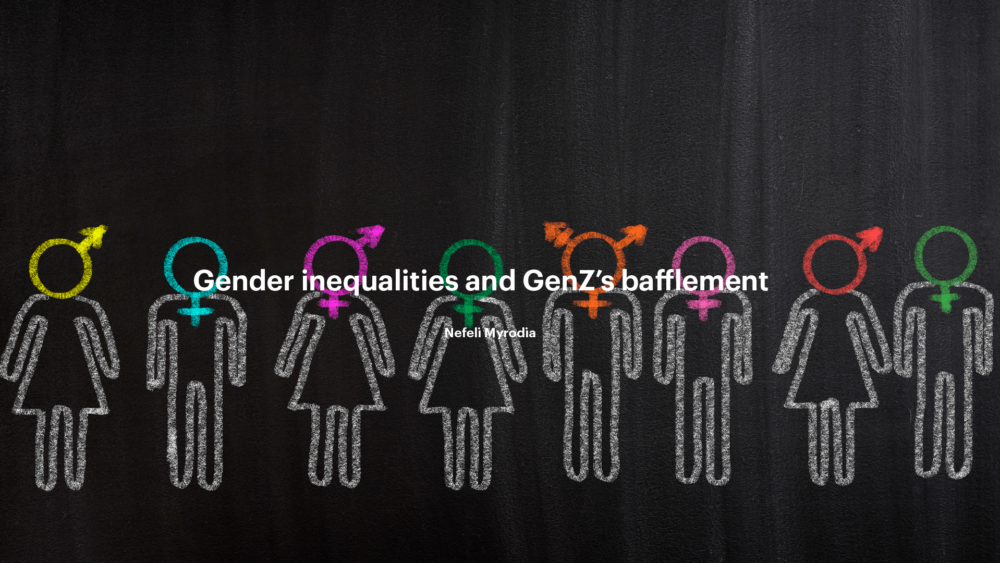
Moral Panic and Greek Politics
Eteron’s Gender Divide survey explores the Greeks’ perceptions on issues such as feminism, gender and critical social pathologies such as femicide in Greece and the need for a legal recognition of the term – an issue that appears to be of interest to an increasing number of researchers and analysts both in Europe 1 and Greece.2
At the same time, the survey highlights an important aspect of Greek society regarding its perceptions of equality, and the factors that affect the position of Greek women in 2024. Furthermore, it looks at the quality of life of trans individuals in Greece in conjunction with the public sentiment towards diversity.
The main conclusion drawn from the findings is that in Greece, unlike other European countries, moral panic over gender issues is not as prevalent. Indicators observed in countries such as Great Britain,3
France, Spain and Germany are not present in the findings of Eteron’s survey on a sample of 2,000 people – an outcome that is positive and rather encouraging. However, there are alarming findings regarding trends amongst men, plus, age appears to be a significant differentiating factor when it comes to progressive values.
In light of the above observations, the following commentary focuses on the social and political dimension of moral panic, as well as on the need to focus on existing public policy issues, and serves as a “warning” of a possible escalation and further targeting of socially vulnerable groups in Greece on issues of gender and sexual identity.
It is necessary to monitor and regularly analyse these issues, especially after the June 2024 European elections, where parties with a single-issue agenda appeared on the Greek political scene,4 openly adopting moral panic, coupled with fear and extremist rhetoric.
Therefore, ETERON sheds light on the Greeks’ perceptions on gender issues, in the hope of ushering in a new era for other institutions, institutes and survey agencies as well – an era during which there will be a lot more focus on several aspects that so far remain relatively unexplored in Greece.
Femicides
Starting with the much-discussed issue of the rise in gender-based violence and femicide in the country, the responses of the participants reflect the acknowledgement of the lack of equality. 79.9% of participants openly acknowledge that Greece is a patriarchal society, while 68.3% believe it is important to impose stricter penalties for crimes against women. Moreover, 65.8% of the respondents stress the need for the term “femicide” to be widely recognised within Greek society.
These figures reflect the strong will of the Greek public opinion, following similar trends in the rest of Europe regarding the legal recognition of a term that remains a political taboo between the government and the opposition.5
The overwhelmingly high number of people calling for recognition of the term comes as a plea to an existing legal framework that is proving to be both weak and inappropriate, with a pressing need for greater protection for Greek women after the sharp increase in the number of such incidents that have taken place in the past four years.6
It is also worth noting that male opinion on this issue is divided, with only 52.6% of men expressing support and 43.3% rejecting it. The increased support observed within the younger age groups, especially Gen Z and Millennials, is also a European phenomenon with youth claiming to have more progressive attitudes towards gender issues.7 This is also confirmed by the more positive sentiment towards feminism amongst the younger age groups, where the results demonstrate a significant finding in the 17-34 age group, who are clearly more open to embracing more progressive views.
LGBTQI+ rights
After a year marked by several violent incidents,8 especially in Northern Greece, where the rise of the far-right is accompanied by homophobic tendencies, Eteron’s survey captures the moral panic that coexists with the participants’ progressive leanings. When asked whether they agree or disagree with same-sex marriage, 60.1% replied that they agree or somewhat agree, while 37.4% said they disagree or somewhat disagree.
The main differences can be detected in the tendencies of young people, who are once again more positive towards the bill, especially those aged 17-44. The political dialogue and toxicity generated by right-wing parties, and by a large part of the ruling party, have caused damage at a social level, as there is a politicisation of human rights in Greece in 2024. The tendencies that emerged in late 2023 and early 2024, with former Prime Minister Antonis Samaras9 and far-right parties such as “Niki” and “Elliniki Lisi” leading the way with homophobic statements within the Parliament, are a blatant attempt to create moral panic.
The politicisation of LGBTQI+ rights is the new battleground for far-right politicians, a phenomenon that is intensifying in other European countries, such as the UK.10The contestation of practices encouraging equal treatment, combined with the Church’s influence and the use of hate speech, played an important role in the Greek media and the parliamentary discussions during the passing of the relevant bill. The lack of sex education in schools and the existence of a strong nationalist homophobic sentiment had a negative impact on Greek people’s attitudes, as reflected in other public opinion surveys this year.11
The moral panic also extends to the rights of trans people in Greece. There is a strong need to depoliticise such issues, and the timing of the publication of Eteron’s research sheds light on existing trends within Greek society, with almost 70% of society acknowledging the fact that trans people in Greece do not lead a decent life.
In conjunction with the anti-LGBTQI+ trends, as manifested in Greece, the findings raise the alarm about the need for equal treatment and respect for diversity. The emergence of single-issue parties, whose aim is to spread homophobic and transphobic views, is a reminder that moral panic is also spreading in Greece, thus increasing the risk of violence when such issues are politicised. Therefore, it is necessary to continuously monitor said trends in order to determine whether they are influenced by the politicisation of human rights.
Summary
Concluding this research commentary, it is important to note that public opinion tends to focus on public policy issues when these are frequently mentioned by the media, even if they do not concern crucial or even real problems.12The moral panic is often magnified by the media, which ought to acknowledge their role in a highly politicised scene that is taking shape in Greece in relation to LGBTQI+ and women’s rights.
The response rates regarding the existence of equality and whether or not it is promoted by the media are indicative of the divide, with 49.8% of participants believing that the Greek media do not contribute to the promotion of equality. The negative opinion on equality is yet another example of the problematic trends and the instrumentalisation of issues that should not be instrumentalised by the media industry.
Therefore, Eteron’s survey findings open a new round of analysis and debate on equality issues, highlighting the need for further recognition of the problems existing within Greek society and the establishment of stronger public policy frameworks in the country that will protect vulnerable social groups. It is only through effective government intervention that a policy promoting equality will be possible, and it should be obvious that the government’s work on equality issues should not be limited to same-sex marriage or adoption. It must be extended with substantial legal protections and a decisive agenda that will act as a protective shield for vulnerable groups across the country.
- Bellizzi, S., Panu Napodano, C.M. and Lorettu, L., 2022. Femicides in Europe: A tragedy beyond Italy. International Journal of Gynecology & Obstetrics, 156(3), pp.580-581.[↩]
- Karakasi, M.V., Voultsos, P., Fotou, E., Nikolaidis, I., Kyriakou, M.S., Markopoulou, M., Douzenis, A. and Pavlidis, P., 2023. Emerging trends in domestic homicide/femicide in Greece over the period 2010–2021. Medicine, Science and the Law, 63(2), pp.120-131[↩]
- The Policy Insitute, 2024. Masculinity and women’s equality: study finds emerging gender divide in young people’s attitudes. Available at: https://www.kcl.ac.uk/news/masculinity-and-womens-equality-study-finds-emerging-gender-divide-in-young-peoples-attitudes[↩]
- Kathimerini, 2024. Angry voters boost the far-right in the north. Available at: https://www.ekathimerini.com/politics/1241651/angry-votersboost-far-rightin-the-north[↩]
- Naftemporiki, 2024. Femicide: The Government says “no” to the the term’s official recognition. An intervention by Efi Achtsioglou. Available at: https://www.naftemporiki.gr/politics/1563212/gynaikoktonia-to-ochi-tis-kyvernisis-stin-episimi-anagnorisi-toy-oroy-kai-i-paremvasi-achtsiogloy (in Greek) [↩]
- Kathimerini, 2024. 80 femicides in 4 years. Available at: https://www.kathimerini.gr/society/562966879/o-makrys-katalogos-ton-gynaikoktonion (in Greek) [↩]
- Baralt, L., Carian, E.K., Johnson, A.L., Lim, S. and Yoon, S.Y., 2020. Millennials and gender in an era of growing inequality. Sociological Perspectives, 63(3), pp.452-460.[↩]
- Kathimerini, 2024. Homophobic attack in Thessaloniki: The 9 people that were arrested get released while the trial hearing on the case was adjourned. Available at: https://www.kathimerini.gr/society/562927126/omofoviki-epithesi-stin-thessaloniki-eleytheroi-oi-9-syllifthentes-anavlithike-i-diki (in Greek) [↩]
- LIFO, 2024. Samaras on same-sex marriage: I shall obviously vote against the bill. Available at: https://www.lifo.gr/now/politics/samaras-gia-gamo-omofylon-zeygarion-profanos-tha-katapsifiso (in Greek) [↩]
- Paternotte, D., 2023. Victor Frankenstein and his creature: The many lives of ‘gender ideology’. International Review of Sociology, 33(1), pp.80-104.[↩]
- Kathimerini, 2024. Survey by Marc: The public opinion on same-sex marriage and adoption. Available at: https://www.kathimerini.gr/politics/562846807/dimoskopisi-marc-oi-apopseis-gia-ton-gamo-ton-omofylon-kai-tin-teknothesia/ (in Greek) [↩]
- Carvalho, João, Carmo Duarte, Mariana, and Ruedin, Didier, 2024. Follow the media? News environment and public concern about immigration. European journal of political research. [↩]



